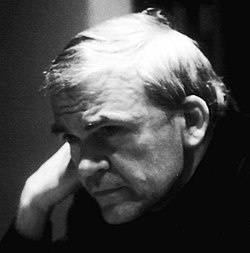Milan Kundera Quote
Epic art is founded on action, and the model of a society in which action could play out in greatest freedom was that of the heroic Greek period; so said Hegel, and he demonstrated it with The Iliad: even though Agamemnon was the prime king, other kings and princes chose freely to join him and, like Achilles, they were free to withdraw from the battle. Similarly the people joined with their princes of their own free will; there was no law that could force them; behavior was determined only by personal motives, the sense of honor, respect, humility before a more powerful figure, fascination with a hero's courage, and so on. The freedom to participate in the struggle and the freedom to desert it guaranteed every man his independence. In this way did action retain a personal quality and thus its poetic form.Against this archaic world, the cradle of the epic, Hegel contrasts the society of his own period: organized into the state, equipped with a constitution, laws, a justice system, an omnipotent administration, ministries, a police force, and so on. The society imposes its moral principles on the individual, whose behavior is thus determined by far more anonymous wishes coming from the outside than by his own personality. And it is in such a world that the novel was born.
Epic art is founded on action, and the model of a society in which action could play out in greatest freedom was that of the heroic Greek period; so said Hegel, and he demonstrated it with The Iliad: even though Agamemnon was the prime king, other kings and princes chose freely to join him and, like Achilles, they were free to withdraw from the battle. Similarly the people joined with their princes of their own free will; there was no law that could force them; behavior was determined only by personal motives, the sense of honor, respect, humility before a more powerful figure, fascination with a hero's courage, and so on. The freedom to participate in the struggle and the freedom to desert it guaranteed every man his independence. In this way did action retain a personal quality and thus its poetic form.Against this archaic world, the cradle of the epic, Hegel contrasts the society of his own period: organized into the state, equipped with a constitution, laws, a justice system, an omnipotent administration, ministries, a police force, and so on. The society imposes its moral principles on the individual, whose behavior is thus determined by far more anonymous wishes coming from the outside than by his own personality. And it is in such a world that the novel was born.
Related Quotes
For everything in this journey of life we are on, there is a right wing and a left wing: for the wing of love there is anger; for the wing of destiny there is fear; for the wing of pain there is heali...
Language and hearing are seated in the cerebral cortex, the folded gray matter that covers the first couple of millimeters of the outer brain like wrapping paper. When one experiences silence, absent...
About Milan Kundera
Kundera's best-known work is The Unbearable Lightness of Being. Before the Velvet Revolution of 1989, the country's ruling Communist Party of Czechoslovakia banned his books. He led a low-profile life and rarely spoke to the media. He was thought to be a contender for the Nobel Prize in Literature and was also a nominee for other awards.
Kundera was awarded the Jerusalem Prize in 1985, the Austrian State Prize for European Literature in 1987, and the Herder Prize in 2000. In 2021, he received the Golden Order of Merit from the president of Slovenia, Borut Pahor.
